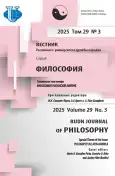Kant’s Structure of the Justification of Practical Reason
- Autores: Semyonov V.Y.1
-
Afiliações:
- Lomonosov Moscow State University
- Edição: Volume 29, Nº 3 (2025): PHILOSOPHY IN LATIN AMERICA
- Páginas: 876-897
- Seção: HISTORY OF PHILOSOPHY
- URL: https://journal-vniispk.ru/2313-2302/article/view/325480
- DOI: https://doi.org/10.22363/2313-2302-2025-29-3-876-897
- EDN: https://elibrary.ru/EHNUJG
- ID: 325480
Citar
Texto integral
Resumo
The research deals with the burning problem of Kant’s justification of practical reason. For in the second Critique Kant asserts that the deduction of the principles of practical reason is impossible , since the objective reality of the moral law cannot be proven by any deduction. How does Kant confirm the entire sphere of practical reason and what stages does he go through in this process? The aim of the article is to explicate and reconstruct the systematic elements and stages of Kant’s justification of practical reason. The aim of the article is to explicate and reconstruct the systematic elements and stages of Kant’s justification of practical reason. Indeed, justification is impossible if we understand deduction as a purely theoretical procedure, which Kant carried out in the Critique of Pure Reason . Yet, Kant himself points out that “ deduction is the justification (Rechtfertigung) of its objective and universal validity”. This justification of the principles of practical reason can be found in Kant’s works and has a certain structure. Firstly, in the Critique of Pure Reason, he justifies the existence of an intelligible world where the determining ground of causality is freedom. In the intelligible domain, the principles of pure reason, based on spontaneity, have objective reality. Thus, in the first Critique , Kant justifies the existence of an intelligible world, freedom as the ground of causality and the ought as a reason for practical action. Secondly, in the Groundwork of the Metaphysics of Morals , Kant demonstrates that freedom carries one to an intelligible world where the good will resides. The good will rests upon freedom and brings forth human autonomy. And it is the good will from which the categorical imperative and morality in general emanate. Thirdly, it is explicated in the second Critique that freedom is the keystone ( Schlußstein ) of practical reason. Here, the moral law (= a “fact of reason”) is instrumental in deducing transcendental freedom itself. This means that the reality of transcendental freedom manifests itself through the moral law. The moral law exists and is effective; therefore, there is transcendental freedom behind it. Thus, the structure of the transcendental deduction of practical reason consists of a step-by-step justification of: the intelligible world, the spontaneity of reason, transcendental freedom, good will, duty (the categorical imperative), the moral law as a “fact of reason”.
Palavras-chave
Sobre autores
Valeriy Semyonov
Lomonosov Moscow State University
Autor responsável pela correspondência
Email: semyonov.ve@philos.msu.ru
ORCID ID: 0000-0002-0486-8697
Código SPIN: 4234-6950
PhD in Philosophy, Professor of the Department of Philosophy
27/4 Lomonosovskiy Ave., Moscow, GSP-1, 119991, Russian FederationBibliografia
- Kant I. Critique of Practical Reason. In: Collection in Russian and German Landg. Vol. 3. Moscow: Moscow Philosophical Fund publ.; 1997. P. 277-733. (In Russian).
- Кant I. Experience in Introducing the Concept of Negative Quantities into Philosophy. In: Collection in 8 volumes. Vol. 2. Moscow: Choro publ.; 1994. P. 41-84. (In Russian).
- Schmitz H. Was wollte Kant? Bonn: Bouvier; 1989.
- Teichiner W. Kants Transzendentalphilosophie. Freiburg; München: Alber; 1978.
- Кант И. Из рукописного наследия (материалы к «Критике чистого разума», Opus postumum) / пер. В.В. Васильева, С.А. Чернова; под ред. В.А. Жучкова. М. : Прогресс-Традиция, 2000. Kant I. From the Manuscript Heritage (materials for the “Critique of Pure Reason”, Opus postumum). Zhuchkov VA, editor; Vasilyev VV, Chernov SA, transl. Moscow: Progress-Traditsia publ.; 2000.
- Kant I. Critique of Pure Reason (B, 1787). In: Collection in Russian and German Landg. Vol. 2. Pt. 1. Moscow: Nauka publ.; 2006. (In Russian).
- Schnepf R. Metaphysik und Metaphysikkritik in Kants Transzendentalphilosophie. In: Kant in der Gegenwart. Jürgen Stolzenberg, editor. B.; N.Y.: Walter de Gruyter; 2007.
- Walker RCS. The Primacy of Practical Reason. In: The Palgrave Kant Handbook. Matthew CA, editor. London: Palgrave; 2018. P. 191-209. https://doi.org/10.1057/978-1-137-54656-2_9
- Timmermann J. Sittengesetz und Freiheit. Untersuchungen zu Immanuel Kants Theorie des freien Willens. B., N.Y.: Walter de Gruyter; 2003. https://doi.org/10.1515/9783110204810
- Guyer P. Transcendental Idealism: What and Why? In: The Palgrave Kant Handbook. Matthew CA, editor. London: Palgrave; 2018. P. 71-90. https://doi.org/10.1057/978-1-137-54656-2_4
- Allison H. Idealism and Freedom. Essays on Kant’s Theoretical and Practical Philosophy. Cambridge: Cambridge University Press; 1996. https://doi.org/10.1017/CBO9781139172875
- Guyer P. Kant’s System of Nature and Freedom. Oxford: Clarendon Press; 2005. https://doi.org/10.1093/acprof:oso/9780199273461.001.0001
- Kant I. Idea for a Universal History from a Cosmopolitan Point of View. In: Collection in Russian and German Landg. Vol. 1. Moscow: Kami publ.; 1993. P. 79-123. (In Russian).
- Allison H. Essays on Kant. Oxford: Oxford University Press; 2012. https://doi.org/10.1093/acprof:oso/9780199647033.001.0001
- Kant I. Groundwork of the Metaphysics of Morals. In: Collection in Russian and German Landg. Vol. 3. Moscow: Moscow Philosophical Fund publ.; 1997. P. 39-275. (In Russian).
- Timmermann J. Deduktion der Grundsätze der reinen praktischen Vernunft. In: Kant-Lexikon: 3 Bde. Willaschek M, Stolzenberg Jü, Mohr G, Bacin S, editors. Bd. 1. Berlin; Boston: Walter de Gruyter; 2015. S. 353-354.
- Ameriks K. Kant and the Fate of Autonomy. Cambridge: Cambridge University Press; 2000. doi: 10.1017/CBO9781139173346
- Himmelmann B. Factum der (reinen praktischen) Vernunft. In: Kant-Lexikon: 3 Bde. Willaschek M, Stolzenberg Jü, Mohr G, Bacin S, editors. Bd. 1. Berlin; Boston: Walter de Gruyter; 2015. S. 596-598.
- Longuenesse B. Kant on the Human Standpoint. Cambridge: Cambridge University Press; 2005. doi: 10.1017/CBO9780511487279
- Allais L. Manifest Reality. Kant’s Idealism and his Realism. Oxford: Oxford University Press; 2015. https://doi.org/10.1093/acprof:oso/9780198747130.001.0001
- Langton R. Kantian Humility. Our Ignorance of Things in Themselves. Oxford: Clarendon Press; 2007.
Arquivos suplementares









